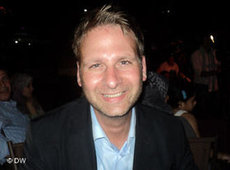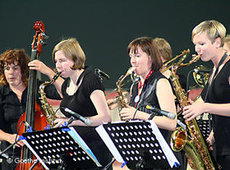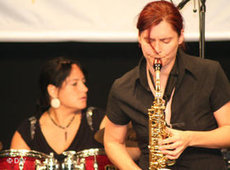Jazz Premiere in Gaza
It was an unusual concert in an unusual location, and levels of audience interest were high following years of cultural isolation. The backdrop could hardly have been more perfect, with the German Women Jazz Orchestra sounding out its first notes in the open air on a balmy summer evening bathed in the light of a full moon. This was most likely one of the first jazz concerts to be held for a very long time in the Gaza Strip, sealed off as it is from the outside world.
The 12 musicians are former and current members of the Federal Jazz Orchestra. The German Women Jazz Orchestra was founded by Deutsche Welle and the German Music Council to mark the Women's Football Cup Arabia 2010 in Bahrain.
Led by the saxophonist and composer Angelika Niescier, the ladies were clearly having a good time and the audience was highly appreciative. "This is a very special moment, I've no intention of missing any more of it," says the young Arab woman Ghada Ziyada. "It's fantastic that the musicians thought of Gaza and came here. The concert gives us the chance to forget about everything for a few hours."
Crossing an otherwise insurmountable border
For a long time it wasn't even certain whether or not the German musicians would be allowed to enter the Gaza Strip at all. After all, only those entitled to one of the special permits issued by the Israeli authorities to the likes of diplomats and journalists are allowed to pass through the high-security Israeli checkpoint at Erez. For most Palestinians, the border is insurmountable.

"I can hardly believe we're in Gaza," says orchestra leader Angelika Niescier, looking around in astonishment as the 12 musicians finally reach the Palestinian side. "I'm really happy to be in Gaza. The first ever jazz concert in Gaza – amazing," she says in delight.
Jörg Schumacher, director of the Goethe Institute in Ramallah and co-organiser of the concert tour, is also visibly relieved. "We've been working on this for more than six weeks, coordinating the whole thing with various authorities," he says. "And of course we always had to have a Plan B up our sleeves, just in case it didn't work out."
At the second checkpoint, which is just a few hundred metres away and where entry to the coastal region is controlled by Hamas security personnel, guards are well-disposed towards the guests from Germany. They spend far less time than usual rifling through bags for alcohol and other undesirables, and even show an interest in what the musicians are doing here. One of the Hamas officials wants to know where and when the concert is going to be, and says he hopes the group has a pleasant stay in Gaza.
An oasis for the Facebook generation
News of the arrival of the German jazz musicians has spread quickly at the concert venue, the Café Gallery in Gaza City. The open-air café has to be converted into a small concert arena in just a few hours. Café Gallery is seen as an alternative meeting place for youngsters, and has become a small oasis for many, a place where the Facebook generation can set up base and escape from the rigours of daily life.
The café's owner, Jamal Abu Al Qumsan, has a contented smile on his face despite the stressful nature of the preparations: "To be perfectly honest, I didn't think it would work out," he says. "We're really happy that we're now going to be treated to a jazz concert, and I'm happy that we can play a small part in that."
Anything but ordinary

After all, putting on a jazz concert in Gaza is anything but ordinary. Israel's closure policy means that the Gaza Strip is completely cut off from the outside world. Exchange with artists and musicians abroad is only possible on a virtual level via the Internet. And the internal situation, determined by an authoritarian government, doesn't make it any easier: since Hamas has been in power, music concerts have become a rarity.
Jamal Abu Al Qumsan sums it up thus: "The local authorities are not in the least bit interested in music, let alone a women's group, playing jazz to boot!" It isn't easy, he adds with a twinkle in his eye, but there are little windows of opportunity. "Let's put in this way: as long as we respect particular restrictions, rules and social values, then it works out somehow," he says.
Power cuts and a warm welcome
Today, Abu Al Qumsan has other things to worry about: the power keeps failing during pre-concert sound checks. Power outages are part and parcel of daily life here in Gaza, where everyone is dependent on generators. "They'll sort it out," Jamal Abu Al Qumsan reassures himself and the musicians.
"Well, it's all part of the experience," says Stefanie Narr, who plays the electric guitar and therefore relies on a power supply. Narr, a young woman with curly blonde hair, says she's been quite simply bowled over by the warm welcome she's received here. "It's the people who've made the greatest impression on me. They're so open and I get the sense that they're really happy that we're here," she says. "It's so totally different from the image portrayed on the news."
This is the reason why for band leader Angelika Niescier, direct exchange with local people and musicians is one of the main objectives of the project: "It's quite clear that cultural exchange is not a free-flowing process here. My head's so full of impressions, I need to work through them first," she says.
A relaxed event

It's just after 8 p.m., and the 12 musicians launch into the first piece as the audience applauds. Modern jazz with few swing or blues elements may not appeal to many people here. Nevertheless, there is a real sense that this is an "event". The audience is a mixed bunch, representatives of the liberal class, listening to the music while sipping on juice or coffee. People laugh and talk during the concert, they're clearly just happy to be there.
And in actual fact, only one thing really matters: that the musicians came to Gaza at all. "To be able to enjoy such a relaxed atmosphere in Gaza is a rarity. Hopefully it won't be the last time," says a young man. Khaled Harara is sitting a few tables away. The 25-year-old raps as a hobby, but he hasn't been able to perform for a long time now since the Hamas government banned such gigs. "I think it's brilliant. A concert like this, it's more than we could ever have dreamed of here in Gaza," he enthuses. "I'd otherwise only get to hear stuff like this on the Internet; I listen to jazz on Youtube – but to hear such professional and serious music like this in Gaza? That's really a one-off."
Having two Palestinian rappers up on stage for a song at the end was the icing on the cake. And in the end, there were only two power cuts during the one-hour concert. The audience, only too familiar with the situation, applauded cheerfully – particularly as the musicians simply continued to play, seemingly unruffled.
Tania Kraemer
© Deutsche Welle 2011
Translated from the German by Nina Coon
Editor: Aingeal Flanagan/Qantara.de
